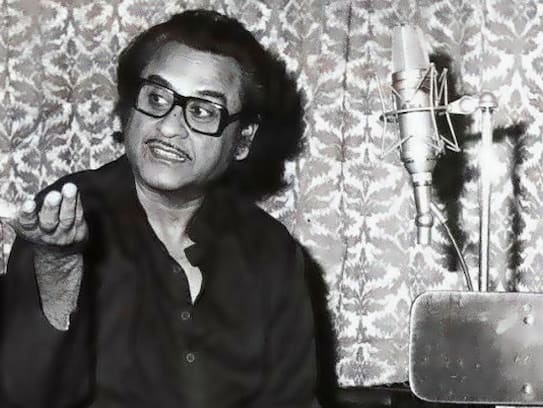

The legendary, versatile singer from Khandwa of Madhya Pradesh, who was born this day in 1929, Kishore Kumar would, once in a while, refuse a song under the pretext that it was too difficult to render. When the composer would finally convince him that he was the most suited for the number, he would deliver a marvel. Or, he would refuse a song to give a budding artiste an opportunity to rise in career, and the new kid on the block would leave the audience floored.

Kishore Kumar alias Abhas Kumar Ganguly had two peculiarities in particular, among many reported eccentricities, which left a positive impact on his recordings. He would often plead with the music composer that he was incapable of rendering a certain song.
“Mere naina saawan bhaado” from Mehbooba was one such number. RD Burman told Kishore there would be a version by Lata Mangeshkar, too. Kishore then asked RD to make Lata sing the number first. RD did. Kishore recorded his version later.
While Lata’s version is more intricate, Kishore’s lasted in public memory. As lyricist Javed Akhtar put in the television series, Classic Legends, if Kishore sang a number, all other versions paled in comparison.
Further, as and when Kishore said a song was too difficult for him, it turned out to be a marvel. The other song he had initially refused was from the Bengali version of the film Amanush featuring Uttamkumar and Sharmila Tagore. The tune is quite different from “Dil aisa kisi ne mera toda” although the picturisation is similar.
Both “Mere naina…” and “Ki ashay bandhi khelaghar” (Bangla) are marked by notes that range from the lowest to the highest octave. These are instance of mastery of the art for which Kishore is rarely credited or remembered. Another song spanning three octaves is “Koi hota jisko apna” from the film Mere Apne featuring Vinod Khanna, Shatrughan Sinha and Meena Kumari.
The other peculiarity Kishore had was refusing to have a session with the composer to rehearse a song. He would ask the music director to send a tape recording of the song in the composer's voice via a courier to him. He would practise the song all alone at home, and then come to the studio for the recording without letting the composer know how well he was prepared. The songs he sang in this manner have been some of his greatest hits, too.
Finally, Kishore is remembered also for refusing songs to offer singers he was fond of an opportunity to rise. Two such songs had Mithun Chakraborty lip-sync to the numbers on screen. “Yaad aa raha hai tera pyaar” in the voice of Bappi Lahiri (Kishore’s nephew) was supposed to be a dummy, recorded for the film Disco Dancer at a time when the famous singer was not in the town (Bombay, now Mumbai). On his return, he heard out the dummy and said it was so good that it need not be replaced.
Kishore did not quite turn down Anu Malik’s “Julie Julie” from the film Jeete Hain Shaan Se. The dates of Anu and Kishore simply did not match. Finally, on listening to the dummy made by the composer, Kishore asked him to place it in the film. While “Julie Julie” is one of the rare renditions by Anu — who hardly has the voice of a singer — that turned a hit, “Yaad aa raha hai” still gives the audience goosebumps, Bappi’s Bengali accented Hindi notwithstanding.
Read Exclusive COVID-19 Coronavirus News updates, at MyNation.